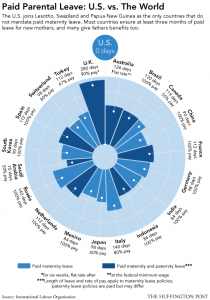
Pictured above are Cardinals: a position occupied only by priests, a position only available to men.
Taught from a young age to be in touch with their emotions, women learn that a main aspect of what sets them apart from men is their ability to utilize these emotions to form and kindle deeper relationships. They are told they wield this skill with more ease than men, as if it is something they can do better than their male counterparts, which then makes it their responsibility to bring men to a similar understanding. It is believed that this passion for relationships is then translated into a lack of yearning for power, as they, being women seek understanding rather than leadership. A woman, according to the Catholic church, is said to have such a close relationship with God that her role within the Church is not to lead, but to help others in finding proximity to God. Because Jesus did not pick women to be his disciples, the Church has come to the conclusion that those permitted to be ordained as priests must be strictly men. However, as the walls of sexual barriers still standing today crumble, reserving priesthood to men alone places the church under deep scrutiny, as many have begun to question the value it places in women. While women are able to play other vital roles in the ministry, the overarching decision making for the Catholic Church is arguably done by bishops and cardinals alone, all of whom must be ordained priests.
I earnestly want to point out that while women and men are still not yet equally represented in each sector of society, there are, to date, very few niches that altogether prevent women from entering. The Catholic Priesthood is one such frontier. To argue that their relationship with God comes easier due to the male to female nature of the relationship is almost synonymous with saying that women should view their connection to God in a marital way. Women should, however, see themselves, as men do, as disciples and children of the Father, not as a spouse. The latter also begs the question: would we not want those leading us in prayer and teaching us the Word of the Lord to have a certain ease in forming a relationship with God?
I love man as my equal and find no fault with male leadership in the church, but men should not be given omnipotence and exclusive access with regards to the teachings and practices of Priesthood. This would mean the church assumes, as so often has happened in decades past, that in all major decisions, men alone have the capacity to make the final call for Catholic individuals world wide, women included. This then belittles the opinions of women within the church, assuming that they should have no say in the rules they follow in order to be viewed as “good Catholics”. Furthermore, it presumes that men have an understanding and depth of knowledge great enough to encompass the thoughts of women as well. A man should have no more right to lead mass than a woman, just as the claim that women have a special access to the heart of Jesus should not be made in a way that excludes men from having the ability to gain that same access to the heart of Jesus.
The restrictions placed on women with regards to their ability to gain the status of a Priest, or further that of a Cardinal, are outdated, and should continue to be questioned. As once occurred with politics and education, men are making all the decisions for the population at large. This is yet another frontier, and the only way to combat this injustice is to question it until they no longer can defend it.


